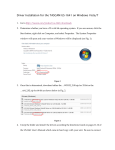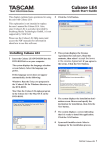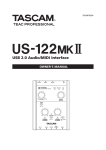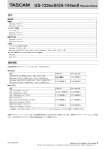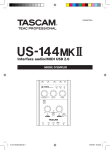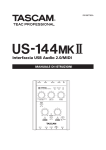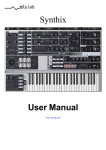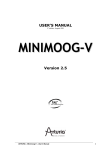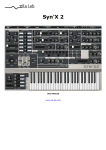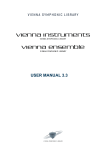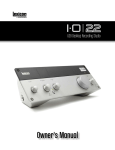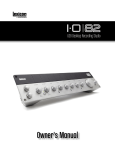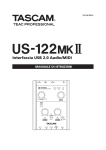Download Cubase LE 5 Quick Start Guide
Transcript
Cubase LE 5 Quick Start Guide This chapter explains basic operations for using the unit with Cubase LE 5. This explanation is not intended to replace the user’s manual for Cubase LE 5. Also, since Cubase LE 5 is a product provided by Steinberg Media Technologies GmbH, it is not supported by TASCAM. Please use the Cubase LE 5 Help menu (and access the PDF manuals) for information about how to use this software. Trademarks •• TASCAM is a trademark of TEAC Corporation, registered in the U.S. and other countries. •• Microsoft, Windows, Windows XP, Windows Vista, and Windows 7 are either registered trademarks or trademarks of Microsoft Corporation in the United States and/or other countries. •• Macintosh, Mac OS and Mac OS X are trademarks of Apple Inc., registered in the U.S. and other countries. •• Cubase and VST are registered trademarks of Steinberg Media Technologies GmbH. ASIO is a trademark of Steinberg Media Technologies GmbH. •• Other company names, product names and logos in this document are the trademarks or registered trademarks of their respective owners. Installing Cubase LE 5 1 Insert the Cubase LE 5 DVD-ROM into the DVD-ROM drive on your computer. The system displays the language selection screen (below). Select the language you prefer. If this language screen does not appear automatically, do the following: Windows: Run the Cubase_LE_5_Start_Center.exe on the DVD-ROM. Mac: Run the Cubase LE 5 Start Center program on the DVD-ROM. TASCAM Cubase LE 5 1 2 The installation screen appears. Click Install Cubase LE 5. 5 The system displays the License Agreement for end users. Read the contents, then select I accept the license agreement if you agree to the terms. Click the Next button. 3 The following screen appears. Click the Next button. 6 A screen appears to confirm that you want to close the eLicenser installer. Press the Finish button. 4 The system displays the eLicenser Welcome screen. Click the Next button to start the installation. 2 TASCAM Cubase LE 5 7 The Cubase LE 5 installer automatically starts. Click the Install button. 8 The system displays the License Agreement for end users. Read the contents, then select I accept the terms in the License Agreement if you agree to the terms. Click the Next button. 9 A screen appears where you can select the location where you want to install the software. Designate the location where you want to install the software and click the Next button. 10 A screen showing that preparation for installation is complete appears. Click the Install button. TASCAM Cubase LE 5 3 11 Installation of Cubase LE 5 starts. You can download updates for Cubase LE 5 from the following Steinberg website. We recommend that you always use the latest version. Please abide by all the precautions listed on the site before updating. http://www.steinberg.net/en/support/ steinberg_support_downloads.html NOTE 12 When the installation completes, press the Finish button to end installation. 13 When the installation completes, press the Finish button to close the installer. 4 TASCAM Cubase LE 5 Cubase LE 5 can be used for 30 days (or launched 3000 times) in demo mode until it becomes disabled. If you want to continue to use it for a long time please refer to the Getting Started on the DVD-ROM and register your program. Recording with Cubase LE 5 The settings in Cubase LE 5 are the same in Windows XP, Windows Vista, Windows 7 and Mac OS X. The screens in the example below are from using a US-144MKII with Windows XP. The following screen appears. Preparation 1 Launch Cubase LE 5 and select Device Setup… from the Devices menu. 2 Click VST Audio System on the left side of the Device Setup window. Set the ASIO Driver item on the right to US-122MKII/US-144MKII. 4 Click US-122MKII/US-144MKII on the left side of the Device Setup window and confirm that the I/O ports are set to US-144MKII ports. Then, click OK to close the window. 3 When the following dialog appears, click the Switch button. TASCAM Cubase LE 5 5 5 Select VST Connections from the Devices menu. Confirm that the Device Port is set to US-144MKII on both the Input and Output tabs. Close the dialog after confirming. The windows should appear as follows and the digital input and output should be available for use. 6 Select New Project from the File menu. TIP To use the digital input and output of the US-144MKII as inputs and outputs for Cubase LE 5, add the digital input and output on the Input and Output tabs of the VST Connections window. •• Click the Add Bus button. •• When the following dialog appears, set the Configuration to STEREO and the Count to 1 and then click the OK button. 6 TASCAM Cubase LE 5 A window appears that allows you to select a template for the new project. Choose the template that you want and click the OK button. 7 Next, the Set Project Folder window appears. Select the folder where you want to save the project and click the OK button to complete creation of a new project. TIP When recording a vocal or an acoustic guitar, for example, with a single microphone, create and record to a mono track. When recording a piano in stereo with two microphones or recording a keyboard or similar device using the stereo line input, create and record to a stereo track. NOTE If you choose the “Empty” template, use the “Add Track” item from the “Project” menu to add audio tracks. TASCAM Cubase LE 5 7 Recording 1 Select the track that you want to record to, and set the input bus in the Input Routing field on the left side of the window. Press the Monitor button if you want to hear the input signal. 2 After you have completed setting the input buses for every track, click the Record Enable buttons (making them red) for the tracks that you want to record on. 3 Press the (REC) button in the transport section to start recording. 4 When you finish recording, press the (STOP) button, then click the Record Enable buttons to turn it off (the button indicator will turn off). Rewind if necessary. 5 Repeat steps 1-4 to overdub additional tracks. 8 TASCAM Cubase LE 5 Mixdown 1 Move the left and right locators to specify the region that you want to mix down. 3 In the Export Audio Mixdown dialog box, make the desired settings, then press the Export button. 2 From the File menu, choose Export > Audio Mixdown. On this screen, set the File Name, Path (location where saved), File Format, Sample Rate, Bit Depth and other attributes of the file to be created. 4. The following screen appears while the file is being created. After the file has been created, press the Close button on the Export Audio Mixdown window to close it. The mixdown file is saved according to the settings made in step 3. TASCAM Cubase LE 5 9 Troubleshooting This chapter answers frequently asked questions related to recording with Cubase LE 5. As shown below, you can confirm that a track is stereo by the word “stereo” in the channel display and by the input display, which should say “Stereo In” or something similar, when the channel is selected. Q1. I think I have configured the input settings properly, but I see no activity on the audio track's meter. A1. Make sure that the Monitor button of the track is enabled. Q3. I am trying to use the EQ, but it does not seem to do anything. Q2. I would like to record two channels simultaneously in stereo. A3. Confirm that one or more EQ switches are on in the EQ section for the channel in the Inspector. A2. Before you record, choose Stereo track(s) or add Audio track(s) as Stereo. If the project does not have a stereo track, select Project menu > Add track > Audio and create the number of stereo tracks that you need. EQ OFF 10 TASCAM Cubase LE 5 EQ ON Q4. I tried to mix down a threeminute song, but could mix only ten seconds. Q6. I burned a CD using the WAV file I mixed down, but the speed is obviously different. A4. Make sure that the region specified A6. Could the sampling rate of your by the left and right locators is set to three minutes or longer. project be set to 48 kHz? If your ultimate objective is to create a CD, TASCAM recommends that the sampling rate be set to 44.1 kHz from the beginning. Q5. I cannot set the locator region to more than ten minutes. A5. The default setting is ten minutes. From the Project menu, choose Project Setup and then change the Length field. To specify the sampling rate, choose Project Settings from the Project menu, then set the sampling rate to 44.100 kHz. Q7. I have connected an audio source to the Unit, but cannot hear anything. A7. Make sure that the input level of the audio interface is raised appropriately. When a signal is being input, the signal indicator of the audio interface will light up green. Make sure that the monitor (or headphone) level is raised, and that the connections are correct. TASCAM Cubase LE 5 11 Q8. The sound is distorted. A8. Make sure that the signal is not overloading. If the signal is analog, the ideal level is when the overload indicator lights up red occasionally. TEAC CORPORATION Phone: +81-42-356-9143 D01113620A 1-47 Ochiai, Tama-shi, Tokyo 206-8530, Japan Printed in China












